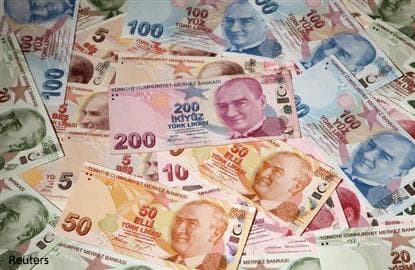
KUALA LUMPUR/SYDNEY (Sept 26): Turkey’s lira led declines in emerging-market currencies after Moody’s Investors Service cut the country’s credit rating to junk and attention shifted to a meeting between oil producers later this week. Developing-nation stocks retreated.
The lira slid to a seven-week low as Moody’s cited rising risks related to Turkey’s external financing needs and weakening credit fundamentals, a decision which followed a downgrade by S&P Global Ratings in July. Currencies and stocks in developing countries fell for a second day before OPEC members and other producers meet Wednesday amid indications Saudi Arabia may agree to lower output to January levels. The Philippine peso fell to a seven-year low.
“The lira weakened as expected, but the drop is not really significant as the market already saw it coming previously with S&P’s cut,” said Wu Mingze, a foreign-exchange trader in Singapore at INTL FCStone Inc., a Nasdaq-listed global payments-service provider. “If the OPEC meeting manages to have any sort of consensus plan, it will be great for market confidence.”
Emerging assets are retreating after the biggest weekly gains since July. Friday’s plunge in oil prices jolted investor sentiment, which had been improving after accommodative monetary policy from the Federal Reserve and the Bank of Japan last week rekindled demand for riskier assets. Recent gains sent valuations in the MSCI Emerging Markets Index to near the highest level since 2010.
The MSCI Emerging Markets Currency Index dropped 0.2 percent as of 10:24 a.m. in Hong Kong. The MSCI Emerging Markets Index declined 0.7 percent, the most since Sept. 13. Taiwan Semiconductor Manufacturing Co., which makes chips for Apple Inc., led suppliers lower on speculation of slower iPhone 7 sales.
The lira sank 0.8 percent, extending its decline in the past two days to 1.7 percent, according to data compiled by Bloomberg. That took losses to about 40 percent against the dollar since 2013, when the U.S. Federal Reserve said it was phasing out its extraordinary monetary stimulus program, raising the prospect of reduced investment flows to emerging markets such as Turkey.
Moody’s Warning
“The risk of a sudden, disruptive reversal in foreign capital flows, a more rapid fall in reserves and, in a worst-case scenario, a balance of payments crisis has increased,” Moody’s said in an e-mailed statement announcing the decision late Friday.“This slow deterioration in Turkey’s credit profile will continue over the next two to three years and the balance of risks are better captured at a Ba1 rating level.”
In other emerging markets, Malaysia’s ringgit declined 0.4 percent per dollar, the biggest loss since Sept. 13 after a 3.7 percent slide in Brent crude Friday weighed on the outlook for the net oil exporter’s finances.
The Philippine peso weakened 0.4 percent to 48.170 and reached 48.175, the lowest since September 2009. South Korea’s won declined 0.4 percent and Taiwan’s dollar retreated 0.3 percent.
“For Asian currencies, market focus is going to be on the U.S. presidential debates starting later today,” said Divya Devesh, a foreign-exchange strategist at Standard Chartered Plc in Singapore. “Markets seems to be adopting a slightly cautious tone heading into the debates, on fears of risk aversion.”
South Korea’s 10-year government bonds were little changed, with the yield steady at 1.50 percent, according to prices from local banks compiled by Bloomberg.